 Writing a book is hard work but a privilege. Sitting down, slogging away, oblivious to neck and shoulders becoming rigid, you ignore the blurring eyes, the headache creeping up over the crown of your head because you are lost in the imaginary country of your book’s world. Writing a book is hard work but a privilege. Sitting down, slogging away, oblivious to neck and shoulders becoming rigid, you ignore the blurring eyes, the headache creeping up over the crown of your head because you are lost in the imaginary country of your book’s world.
Your characters smell the pines, shiver at the fresh mountain air and grumble about hot, tired feet enclosed in hiking boots. In the town, they swerve to avoid the bad guys chasing them, curse at the traffic holding them back, shudder when another car screeches, hitting the paintwork of their car.
 The heroine’s heart thumps on the adrenaline high of the chase, or melts as her child’s arms encircle her neck and hug her tight, or her lover’s eyes travel up and down her body, settling on her face, and he smiles warmly at her with eyes full of love. The heroine’s heart thumps on the adrenaline high of the chase, or melts as her child’s arms encircle her neck and hug her tight, or her lover’s eyes travel up and down her body, settling on her face, and he smiles warmly at her with eyes full of love.
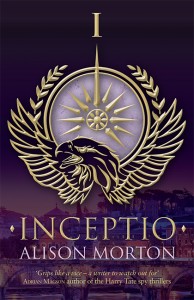 Publishing a book is when you wrench yourself out of that world and enter the long, long process of edits, production and consultations. But when you first see the cover proof, you know exactly how your heroine feels in the heart-thudding department. When I opened the .PDF file for INCEPTIO, I sat speechless, my eyes fixed on the computer screen, marvelling at the beauty of the rich imperial purple and gold design blending modern graphics with strong Roman symbols. Publishing a book is when you wrench yourself out of that world and enter the long, long process of edits, production and consultations. But when you first see the cover proof, you know exactly how your heroine feels in the heart-thudding department. When I opened the .PDF file for INCEPTIO, I sat speechless, my eyes fixed on the computer screen, marvelling at the beauty of the rich imperial purple and gold design blending modern graphics with strong Roman symbols.
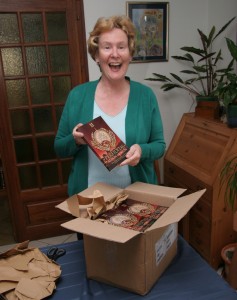 I was excited when I received the shipping notice but when door bell sounded 36 hours later, I ran up the stairs from my basement office like an Olympian in training and flung open the heavy wooden door to find a smiling courier with four boxes of books. It was exactly the same sensation when PERFIDITAS arrived. I was excited when I received the shipping notice but when door bell sounded 36 hours later, I ran up the stairs from my basement office like an Olympian in training and flung open the heavy wooden door to find a smiling courier with four boxes of books. It was exactly the same sensation when PERFIDITAS arrived.
Telling all your friends about it is mildly embarrassing at first, but exciting – just watch their faces! They find it hard to believe that you, their friend, has written a book, and such a beautiful book, too!
 They sit entranced at your launch; they’re desperate to glimpse inside your imagined world and to know the story of how this came to be. They sit entranced at your launch; they’re desperate to glimpse inside your imagined world and to know the story of how this came to be.
Selling your book is the biggest thrill, not just receiving the note or coins, although that’s very nice, thank you. You are handing your world over to be shared, loved and hopefully cherished. When the reviews come, you worry about reading them. But when a true fan emails you direct, tweets or posts about how much they enjoyed your book, and how it now ranks in their top books, your (rather over-worked) heart nearly bursts with joy (and pride)!
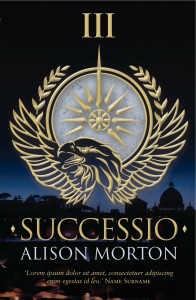 Publishing SUCCESSIO is the third time I’ve experienced this, and believe me, the work doesn’t get any less, but the fun and thrills don’t either. If you’re a reader, the door will be open to a new Roma Nova adventure on 3 June. If you’re a writer as well, never stop the hard work because seeing and feeling your book in your hands will make you laugh and cry with pleasure for years. Publishing SUCCESSIO is the third time I’ve experienced this, and believe me, the work doesn’t get any less, but the fun and thrills don’t either. If you’re a reader, the door will be open to a new Roma Nova adventure on 3 June. If you’re a writer as well, never stop the hard work because seeing and feeling your book in your hands will make you laugh and cry with pleasure for years.
Alison Morton is the author of Roma Nova thrillers, INCEPTIO, and PERFIDITAS. Third in series, SUCCESSIO, is out June 2014.
If you enjoyed this post, do share it with your friends!Like this:Like Loading...
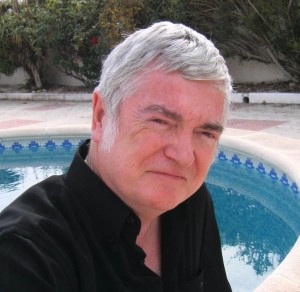 Today, I’m delighted to welcome Nik Morton (no relation!), who also writes as Ross Morton and a few other names besides… Ex-Royal Navy, ex-IT, expat living in Spain, he works as an editor and writer of short stories, articles and novels. Added to this he draws cartoons and illustrates comics, stories and magazine covers. To date, he has 20 books published, the latest of which is Sudden Vengeance, out this last week. As he writes thrillers in a modern historical context, I asked him to give us his perspective on history. Today, I’m delighted to welcome Nik Morton (no relation!), who also writes as Ross Morton and a few other names besides… Ex-Royal Navy, ex-IT, expat living in Spain, he works as an editor and writer of short stories, articles and novels. Added to this he draws cartoons and illustrates comics, stories and magazine covers. To date, he has 20 books published, the latest of which is Sudden Vengeance, out this last week. As he writes thrillers in a modern historical context, I asked him to give us his perspective on history.
At school – a long, long time ago – history was one of my favourite subjects. The others were English, Geography and Art. I’d draw images from the past – using statues or photos – to illustrate my essays; maybe it was an excuse just to draw! The history bug never left me, however. I read voraciously, not only fiction but non-fiction. I devoured the books spawned by the Second World War – Carve Her Name With Pride, Odette, Boldness Be My Friend, etc. – and books about Empire. The Washing of the Spears by Donald R. Morris and Shaka Zulu by E.A. Ritter being a couple. Little did I realise I would eventually serve on the RN frigate HMS Zulu and visit Zululand some years later. Fiction informed me about history too. I enjoyed the Flashman books, and the Dennis Wheatley novels; I recall a teacher pointing out to the class that fiction writers bring the past alive, more than dry history books. Of course, the authors have to use those ‘dry history books’ in their research, and usually give credit where due.
I started writing when I was about fourteen, on a Remington portable typewriter. I’d written two novels by age sixteen, but they had little to do with history. It was a long haul from those days to now. Still, I soon became aware that the times we were living in – the 1960s – were historic. Silly, really, since whatever period we live in the now, it will become history. But that’s the point. We are history.
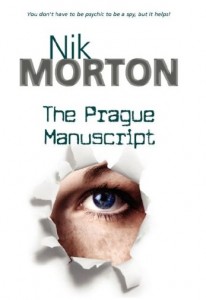 When I started writing in earnest (a small county of the mind), I began researching material. My first serious foray was in 1975, delving into Czechoslovakia. A troubled country that had more than its fair share of history by then already – and more to come, of course. I suppose that’s when I caught the bug. The book was eventually put aside until later, and I researched other interesting material – the history of psychical research, for example. That story, which began as a short piece, grew and grew over the years and became the first in a series about a psychic spy, Tana Standish. A series about the 1970s and 1980s – history I’d lived through. The series covered the 1968 Soviet invasion of Czechoslovakia, the toppling of the Shah during the Islamic Revolution of Iran, the Soviet ‘invasion’ of Afghanistan, and the Falklands War; the series is projected to cover many other events in our recent past. When I started writing in earnest (a small county of the mind), I began researching material. My first serious foray was in 1975, delving into Czechoslovakia. A troubled country that had more than its fair share of history by then already – and more to come, of course. I suppose that’s when I caught the bug. The book was eventually put aside until later, and I researched other interesting material – the history of psychical research, for example. That story, which began as a short piece, grew and grew over the years and became the first in a series about a psychic spy, Tana Standish. A series about the 1970s and 1980s – history I’d lived through. The series covered the 1968 Soviet invasion of Czechoslovakia, the toppling of the Shah during the Islamic Revolution of Iran, the Soviet ‘invasion’ of Afghanistan, and the Falklands War; the series is projected to cover many other events in our recent past.
Concurrently with that series, I wrote about a nun who used to be a policewoman. It’s not unusual for nuns to take orders from varied walks of life. Her journey harked back to her past, when she was a policewoman. That’s the beauty of fiction – you can flashback to crucial events that shape the protagonist – delve into their personal history. The invented order that Sister Rose joined had a history going back some hundred years and the nuns suffered greatly for their cause.
 Western books! History beckoned in another guise, more or less at the same time. I embarked on my first Western. I’d hankered after writing a Western for many years but didn’t believe I could be authentic enough. Fortunately, research and maturity helped and I’ve had seven Westerns published to date – plus a guide on how to write a Western in 30 days! The Old West is history and is rich in material and true-life stories that can be adapted for fiction. Several of these novels are built on a present that is being warped by events in the past; history will have its say.
So will history always catch us in the end? What do you think?
Find out more about Nik here…
Website – www.freewebs.com/nikmorton
Twitter – @nik_morton
Blog – http://nik-writealot.blogspot.com
http://auguries-magazine.blogspot.com
Facebook – nik.morton.10@facebook.com
Goodreads – http://www.goodreads.com/Nikmorton
What’s Nik’s latest book, Sudden Vengeance about?
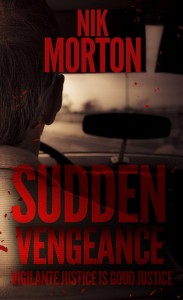 When justice fails, a vigilante steps forward. When justice fails, a vigilante steps forward.
In the broken Britain of today, faith in the police is faltering. Justice and fairness are flouted. Victims are not seen as hurt people but simply as statistics.
Paul’s family is but one example of those victims of unpunished criminals. In the English south coast town of Alverbank, many others are damaged and grieving. It cannot go on. There has to be a response, some way of fighting back.
A vigilante soon emerges and delivers rough justice, breaking the bones and cracking the heads of those guilty individuals who cause pain without remorse.
Who is the vigilante? He – or she – is called the Black Knight. The police warn against taking ‘the law into your own hands’. But the press laud the vigilante’s efforts and respond: ‘What law?’
Will the Black Knight eventually cross the line and kill?
Paul and his family seem involved and they are going to suffer…
Alison Morton is the author of Roma Nova thrillers, INCEPTIO, and PERFIDITAS. Third in series, SUCCESSIO, is out June 2014.
If you enjoyed this post, do share it with your friends!Like this:Like Loading...
Oo-er! The SUCCESSIO paperback is starting to appear in online shops…
 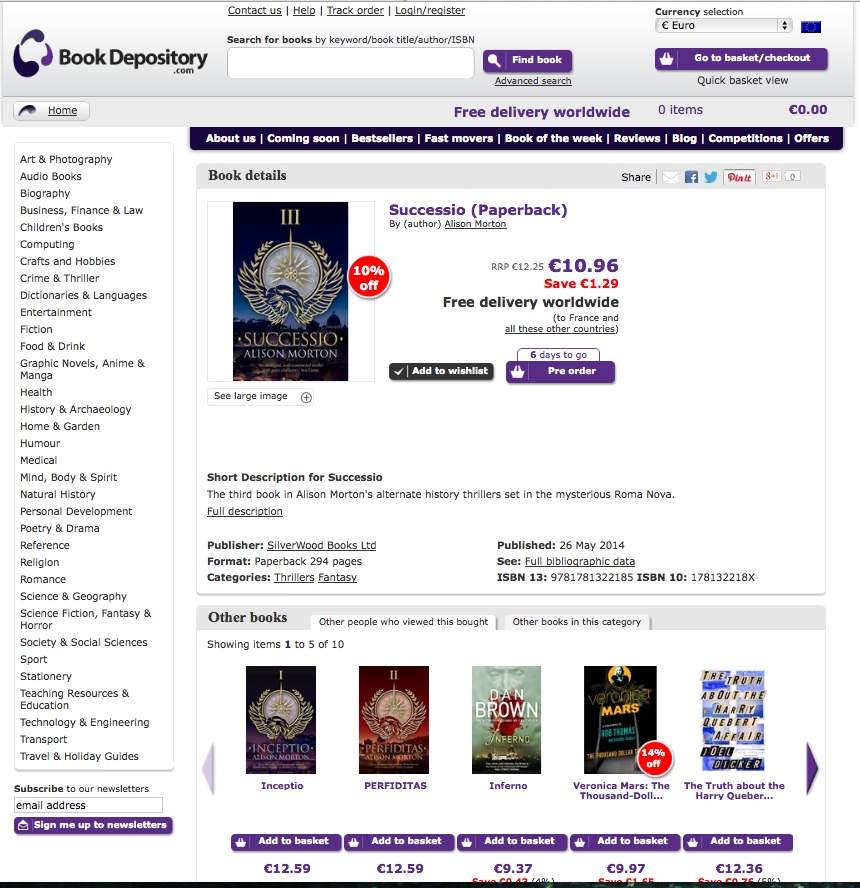
(It’s in euros because that’s my local currency 😉 )
Alison Morton is the author of Roma Nova thrillers, INCEPTIO, and PERFIDITAS. Third in series, SUCCESSIO, is out June 2014.
If you enjoyed this post, do share it with your friends!Like this:Like Loading...
 Steampunk themed photo: Kyle Cassidy When people ask me about my books, I say ‘Thrillers – alternative history thrillers.’
‘Oh, steampunk, then?’
I gnash my teeth, but put on a pleasant smile.
‘No, actually, they’re adventure stories set in our world, but where history evolved alternatively.’
‘Oh, steampunk, then?’
’No, that’s more fantastical and based on Victorian technological ideas.

My alternative history world exists in the 21st century based on the difference caused by a small dissident Roman colony surviving from ancient times.’
‘Oh, not steampunk, then?’
‘No, steampunk is a separate sub-genre of science fiction with steam-powered machinery, inspired by industrialised society of the 19th century. Recently, it’s expanded from the Victorian period into American West or post-apocalyptic-themed, sometimes off-world.’
’So it’s not alternative history?’
‘In a way, because it’s one version of a possible historical development, but often with fantasy elements such as fairies and other planets which tip it more into fantasy or science-fiction proper.
 Alternative history, on the other hand, can include every period where the time-line changed but isn’t fantasy. Favourites are what if the Spanish Armada had succeeded in invading England or if the Nazis had won the Second World War as in Robert Harris’s Fatherland.’ Alternative history, on the other hand, can include every period where the time-line changed but isn’t fantasy. Favourites are what if the Spanish Armada had succeeded in invading England or if the Nazis had won the Second World War as in Robert Harris’s Fatherland.’
‘God, it’s complicated!’
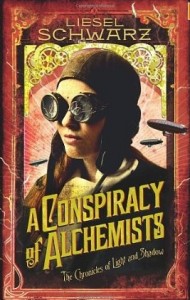 ‘If you want a great example of steampunk that really defines the genre, read Liesel Schwarz’s Chronicles of Light and Shadow. Here’s the first one – A Conspiracy of Alchemists.’ ‘If you want a great example of steampunk that really defines the genre, read Liesel Schwarz’s Chronicles of Light and Shadow. Here’s the first one – A Conspiracy of Alchemists.’
‘Okay, good tip.’
She picks up INCEPTIO and PERFIDITAS and hands over 22€. I smile and wish her happy reading.
She turns and asks, ‘So when are you going to write a proper steampunk story?’
I collapse on to my chair and weep.
Much more detail here on what alternate history is really about.
Alison Morton is the author of Roma Nova thrillers, INCEPTIO, and PERFIDITAS. Third in series, SUCCESSIO, is now out.
Find out about Roma Nova book progress, news, writing tips and info by signing up for my free monthly email newsletter.
If you enjoyed this post, do share it with your friends!Like this:Like Loading...
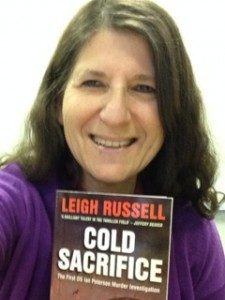 Today I’m welcoming the fabulous Leigh Russell to the blog. Hailed as ‘a brilliant talent’ by Jeffery Deaver and ‘a deeply human voice’ by Peter James, Leigh writes the internationally bestselling Geraldine Steel series of psychological crime thrillers. Her first novel, Cut Short was shortlisted for a CWA Dagger Award for Best First Crime Novel. The series reached Number 1 on Kindle for female sleuths, Top 50 Bestsellers Chart for WH Smith’s Travel, Top Reads list on Eurocrime. As well as the bestselling Geraldine Steel series, Leigh is currently writing a spin off series featuring Geraldine’s popular colleague Ian Peterson. Today I’m welcoming the fabulous Leigh Russell to the blog. Hailed as ‘a brilliant talent’ by Jeffery Deaver and ‘a deeply human voice’ by Peter James, Leigh writes the internationally bestselling Geraldine Steel series of psychological crime thrillers. Her first novel, Cut Short was shortlisted for a CWA Dagger Award for Best First Crime Novel. The series reached Number 1 on Kindle for female sleuths, Top 50 Bestsellers Chart for WH Smith’s Travel, Top Reads list on Eurocrime. As well as the bestselling Geraldine Steel series, Leigh is currently writing a spin off series featuring Geraldine’s popular colleague Ian Peterson.
Now I only have two questions for you, Leigh, but you need to answer them fully. Anything you say…Well, you know the rest.
Ever since Geraldine Steel burst on to the (crime) scene, she has had unparalleled success (CWA awards, #1 on Amazon, Eurocrime Top Read and hundreds of 5 star reviews); readers have taken her to their hearts. What makes her such an attractive heroine?
My interest in people is what inspires my writing, and people who kill really fascinate me. What is it that drives one person to take another person’s life?
Of course, there can be a number of motives driving such behaviour. It seems to me there is always an element of madness about it. Do you remember Anders Breivig who killed eight people in Norway and claimed to be sane? All I can say is, if that is sane behaviour, then I must be even more crazy than I thought, because I don’t believe that killing other people is ever a sane way to behave. I am opposed to physical violence of any kind. Aggression is never an answer to a problem. And yet… if someone was threatening the life of a member of my family, and I had a gun – and knew how to use it – would I pull the trigger? Of course I would. Does that mean I’m insane?
When I started writing, it was the killer, and not my detective at all, who engaged my attention. I wrote pages and pages about him, “taking the reader into the darkest recesses of the human psyche”, as Barry Forshaw kindly said of my books. Having established the premise for my debut, Cut Short, and explored the lives of my killer and his victims, the next step was to introduce a detective to solve the crime. So Geraldine Steel was created.
You might think – as I did – that a credible ‘normal’ detective would be far easier to create than a plausible killer. Paradoxically, Geraldine took longer to emerge than that first killer. Creating a detective inspector imposes certain restraints. She has to behave in a way that is believable. So I had to stay within certain unwritten parameters of ‘normality’ if my readers weren’t going to dismiss my story as too far-fetched. I have a following on the police force. They know what life is like for a detective inspector. So I wanted to get my detective right.
With my killer I had absolute artistic and creative licence to make him do whatever I wanted. He didn’t need to be sane. His actions needed to make sense only within the world of his own mind. No reader could say to me, ‘I don’t believe a killer would do that,’ because how would the reader know what might go on in a killer’s mind? Writing my killer, I was free of all rules. It was incredibly liberating.
Readers’ reactions to both Geraldine Steel and Ian Peterson has taken me completely by surprise. Some of my fans know more about my detectives than I do! I am really grateful to the many fans who contact me wanting to know about them. It has been genuinely surprising, and really thrilling. So if you are a fan of my work – thank you!
What is the most frequent question that fans/readers ask you and how do you answer it?
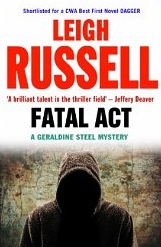 Readers contact me every week via my website, with all sorts of questions. I always respond in person. Most frequently I’m asked when my next book will be published. This question has become rather complicated to answer. When my debut came out in 2009, there was one launch date, and that was it. Now I’m not only writing two series a year, but the ebooks and print books come out at different times, which is effectively four publication dates a year in the UK alone, plus large print editions and audio, and now there are publication dates overseas as well, with editions in French, Italian, Turkish, and German, and books published in the US by Harper Collins. Readers contact me every week via my website, with all sorts of questions. I always respond in person. Most frequently I’m asked when my next book will be published. This question has become rather complicated to answer. When my debut came out in 2009, there was one launch date, and that was it. Now I’m not only writing two series a year, but the ebooks and print books come out at different times, which is effectively four publication dates a year in the UK alone, plus large print editions and audio, and now there are publication dates overseas as well, with editions in French, Italian, Turkish, and German, and books published in the US by Harper Collins.
Here are the remaining UK publication dates for 2014. The sixth Geraldine Steel title, Fatal Act, is available in paperback this month. The seventh will be out as an ebook in December, as yet untitled.
The second Ian Peterson title, Race to Death, is out as an ebook in June, with the paperback out in September.
…And looking at that schedule, I think I’d better get back to writing! Thank you very much for inviting me onto your blog, Alison. I look forward to seeing you at the St Clementin Literary Festival in France in August!
After chatting together at the London Book Fair in April, it will be great to meet up with you again in France, Leigh!
More about Leigh on her website
If you enjoyed this post, do share it with your friends!Like this:Like Loading...
|
Subscribe to Blog via Email
Join 50 other subscribers.
Categories
Archive
|
 Writing a book is hard work but a privilege. Sitting down, slogging away, oblivious to neck and shoulders becoming rigid, you ignore the blurring eyes, the headache creeping up over the crown of your head because you are lost in the imaginary country of your book’s world.
Writing a book is hard work but a privilege. Sitting down, slogging away, oblivious to neck and shoulders becoming rigid, you ignore the blurring eyes, the headache creeping up over the crown of your head because you are lost in the imaginary country of your book’s world. The heroine’s heart thumps on the adrenaline high of the chase, or melts as her child’s arms encircle her neck and hug her tight, or her lover’s eyes travel up and down her body, settling on her face, and he smiles warmly at her with eyes full of love.
The heroine’s heart thumps on the adrenaline high of the chase, or melts as her child’s arms encircle her neck and hug her tight, or her lover’s eyes travel up and down her body, settling on her face, and he smiles warmly at her with eyes full of love. Publishing a book is when you wrench yourself out of that world and enter the long, long process of edits, production and consultations. But when you first see the cover proof, you know exactly how your heroine feels in the heart-thudding department. When I opened the .PDF file for INCEPTIO, I sat speechless, my eyes fixed on the computer screen, marvelling at the beauty of the rich imperial purple and gold design blending modern graphics with strong Roman symbols.
Publishing a book is when you wrench yourself out of that world and enter the long, long process of edits, production and consultations. But when you first see the cover proof, you know exactly how your heroine feels in the heart-thudding department. When I opened the .PDF file for INCEPTIO, I sat speechless, my eyes fixed on the computer screen, marvelling at the beauty of the rich imperial purple and gold design blending modern graphics with strong Roman symbols. I was excited when I received the shipping notice but when door bell sounded 36 hours later, I ran up the stairs from my basement office like an Olympian in training and flung open the heavy wooden door to find a smiling courier with four boxes of books. It was exactly the same sensation when PERFIDITAS arrived.
I was excited when I received the shipping notice but when door bell sounded 36 hours later, I ran up the stairs from my basement office like an Olympian in training and flung open the heavy wooden door to find a smiling courier with four boxes of books. It was exactly the same sensation when PERFIDITAS arrived. They sit entranced at your launch; they’re desperate to glimpse inside your imagined world and to know the story of how this came to be.
They sit entranced at your launch; they’re desperate to glimpse inside your imagined world and to know the story of how this came to be. Publishing SUCCESSIO is the third time I’ve experienced this, and believe me, the work doesn’t get any less, but the fun and thrills don’t either. If you’re a reader, the door will be open to a new Roma Nova adventure on 3 June. If you’re a writer as well, never stop the hard work because seeing and feeling your book in your hands will make you laugh and cry with pleasure for years.
Publishing SUCCESSIO is the third time I’ve experienced this, and believe me, the work doesn’t get any less, but the fun and thrills don’t either. If you’re a reader, the door will be open to a new Roma Nova adventure on 3 June. If you’re a writer as well, never stop the hard work because seeing and feeling your book in your hands will make you laugh and cry with pleasure for years.




















